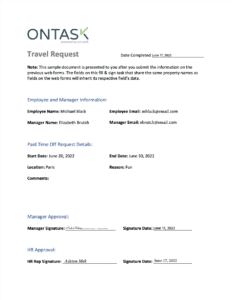Well-drafted and efficiently managed construction contracts are at the heart of a successful contracting business. Without clearly defined elements and procedures, businesses risk wasting time and resources, extending project timelines, and increasing manual labor. Understanding the role of construction contracts in your business is essential.
In this guide, we break down the fundamentals of effective contract management, including key components to include and the advantages of digitizing your contracts. Let’s dig in.
What is a Construction Contract Agreement?
A construction contract agreement is a legally-binding document that outlines the specifics of a construction project, including scope, pricing, timelines, responsibilities, and other critical details. This document often includes payment schedules, terms and conditions, dispute resolution provisions, warranties, and legal obligations.
Historically, these contracts have been managed through paper-based systems or even verbally. While both formats can be legally binding, the shift towards digital contracts are becoming more prevalent. Digital contracts streamline operations by offering quicker turnaround times, centralized documentation, enhanced compliance with data regulations, and integration into automated workflows.
The move to digital means significant time savings for you and your team, reducing the need for drafting extensive paperwork or chasing down clients for signatures.
5 Benefits of Digital Construction Agreements

While seasoned contractors may be hesitant to change their processes, transitioning to digital contract management offers several significant advantages:
- Improves turnaround times – Digitized contracts can be easily integrated with automated eSignatures, task assignments, and reminders. This streamlines administrative tasks, making the process as easy as a few clicks for the customer. An easier process accelerates closings and ensures more projects are completed on-time.
- Reduces errors – With automated digital contracts, you can automatically replicate common steps in the contract process to ensure nothing is overlooked. Features like auto-generating contracts by type, setting triggers for approvals and signings, scheduling reminders, and maintaining a central document version for reference all help minimize errors.
- Scales easily with the right tools – With the appropriate contract lifecycle management tool, you can create customizable contract templates that adapt as your business grows. Custom workflow automation eliminates redundant manual work, allowing your business to expand without a proportional increase in administrative costs.
- Enhances ROI – The first thing people think of when considering investing in new software is the cost. A more effective way to look at the question is through the lens of return on investment (ROI). A tool that automates a significant portion of time-consuming administrative tasks can quickly justify its costs. Automation is not only more cost-effective than manual processes, but also frees up your team for higher-value tasks that are crucial for growing businesses and boosting profit margins.
- Simplifies your work – A well-designed tool should make things easier, not more complicated. By automating repetitive tasks, you can reduce the volume of emails and phone calls, leading to fewer issues to troubleshoot. An intuitive tool enhances your team’s focus on customer satisfaction rather than mundane tasks.
These benefits highlight why digital construction agreements are not just a trend, but a strategic upgrade to traditional contract management, providing efficiency, scalability, and significant operational advantages.
How to Write a Construction Contract Agreement
Crafting an effective construction contract is crucial for clear communication and legal protection in any building project. While details may vary depending on the business and project, here are essential components most contracts should include. Always consult a legal expert to ensure your contract is comprehensive and compliant.
- Project scope, pricing, & payment schedules – Clearly outline what work will be done, the costs involved, and payment timelines. Consider adding provisions for property protection, debris containment and cleanup, finish work specifics, and distinctions between contractor and customer-supplied materials. This clarity prevents future disputes and ensures both parties are on the same page.
- Timelines & responsibilities – Setting clear project timelines and expectations will delineate responsibilities for each party. This is crucial to avoid confusion, especially when unexpected requests for rush work arise. Documenting the agreed schedule and responsibilities also helps manage expectations and maintains workflow integrity.
- Legal requirements – Include any necessary legal obligations, such as permits and licenses required to carry out the work. Ensuring all legal bases are covered prevents potential roadblocks during the project.
- Warranties & dispute resolution provisions – If offering a warranty, clearly state its terms in the contract to avoid misunderstandings. Similarly, outline a specific process for resolving disputes. Having these agreements in writing ensures both parties understand how conflicts will be handled, which can save time and legal expenses.
- Process for changes in scope & terms – Scope creep is the bane of any contractor’s existence. Define how changes to the scope or terms of the contract can be made, including who can initiate changes and how they are approved. This not only saves you the headache, but makes the process much clearer for the customer. Clear expectations can ensure customer satisfaction and protect your margins.
- Termination conditions – Detail when and how the contract can be terminated. Specify whether the agreement is time-bound, task-bound, or requires explicit termination upon completion. Clear termination conditions can prevent legal issues and clarify the end of a business relationship.
- Insurance & workers’ compensation – State what insurance and workers’ compensation coverage is required for both the customer and the construction crew. This is critical to avoid financial or legal disputes related to injuries or accidents on-site.
Leveraging eSignatures for Construction Contracts
Consider using eSignatures for construction contracts to enhance the efficiency of your contracting process. eSignatures can be seamlessly integrated into your contract management platform, allowing for quick, secure, and easy collection of signatures from all parties involved.
Docubee for Construction Agreements
Docubee provides an intuitive platform to streamline your construction agreements. With features like custom contract templates, integrated eSignatures, automatic contract routing, and custom branding, Docubee makes managing construction contracts simpler and more efficient. Take advantage of a simpler contract management process, including:
- Integrated eSignature – Incorporating eSignatures directly into the workflow is a game-changer. Docubee ensures that all parties can sign contracts quickly and securely on a centralized platform, significantly reducing the time traditionally spent on obtaining signatures. This feature not only speeds up contract execution but also enhances the overall efficiency of the contract management process.
- Custom contract templates – Docubee allows you to replicate pre-existing contracts as templates or create completely tailored templates using a dedicated AI generator. This eliminates the need for manual drafting. Simply review, edit, and your contracts are ready to go. This feature significantly cuts down on administrative time and ensures consistency across all documents.
- Automatic contract routing – Forget about the hassle of manually sending contract files to each party and chasing them for signatures. Docubee automates the entire process, routing documents to all relevant parties and sending reminders if they don’t sign on time. This ensures that no contract is delayed due to miscommunication.
- Custom branding – Maintain your company’s professional image with custom branding for all contracts. Docubee allows you to set up clean, consistent branding that is tailored to your business, reinforcing your brand identity with every contract sent out.
By prioritizing these features, Docubee not only simplifies the contract management process, but also ensures that each contract is handled with utmost efficiency and professionalism, aligning with the specific needs of the construction industry.
Get a closer look at how Docubee streamlines contracts. Check out our contract automation fact sheet here.











